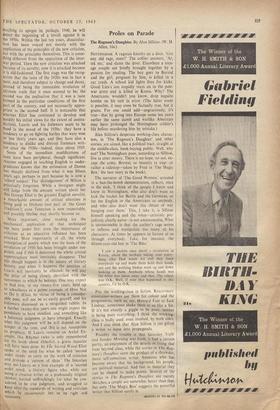Proles on Parade
NOTTINGHAM. A ragman knocks on a door. `Got any old rags, mate?' The collier answers, 'Ar, tek me,' and slams the door. Elsewhere a teen- age couple are briefly brought together by a passion for stealing. The boy goes to Borstal and the girl, pregnant by him, is killed in a car crash. A school kid lights fires for kicks. Good Liza's son stupidly stays on in the post- war army and is killed in Korea. Why? The Americans, wouldn't you know, drop napalm bombs on his unit in error. (The latter event is possible, it may even be factually true, but it grates. For one could add—ungraciously, it's true—that by going into Europe some ten years earlier the same dumb and warlike American may have prolonged the Nottingham soldier's life before murdering him by mistake.)
Alan Sillitoe's desperate working-class charac- tess, in The Ragman's Daughter' and other stories, are aimed, like a political tract, straight at the middle-class, book-buying public. Well, why not? The Nottingham poor, according to live in utter misery. There is no hope, no out, ex- cept the army. Borstal, or insanity (a step----or rather a sidestep=taken by Fred in 'The Magic • Box,' the best story in the book).
The narrator of 'The Good Women,' arrested in a ban-the-bomb demonstration, reflects, once in the nick, 'I think of the people I know and knew in Nottingham, who also don't want to kick the bucket for Berlin and the Germans, or for the English or the Americans or anybody, and who also don't want this threat of war hanging over them.' This, I take it, is Sillitoe himself speaking and the voice—certainly pre- judiced, clearly naive—is not unreasonable. What is unreasonable is that the author's rage seems to inflame and manipulate too many of his characters. At times he appears to lecture at us through everybody. Take, for instance, the fifteen-year-old boy in 'The Bike.'
saw a picture once about a revolution in Russia, about the workers taking over every- thing (like Dad wants to) and they lined everybody up and made them hold their hands out and the working blokes went up and down looking at them. Anybody whose hands was lily-white was taken away and shot. The others was O.K. Well, if ever that happened in this country, I'd be O.K. . . .
Pity the working-class in fiction. Reactionary entertainer-writers use them for colour and the progressives, such as, say, Howard Fast or Jack Lindsay, sometimes shake them at us like a fist. If it's not exactly a giggle to be poor, neither is being poor everything. I think the working- class is badly used, even insulted, by both sides. And I also think that Alan Sillitoe is too gifted a writer to lapse into propaganda.
Possibly the trouble is that Saturday Night and Sunday Morning was fresh, it had a certain purity. an enjoyment of the details of living that went beyond class, while the stories in The Rag- man's Daughter seem the product of a shrewder, more self-conscious writer. Someone who has become aware that his background, his people, are political material. And that as material they can be shaped to make points. Several of the stories in The Ragman's Daughter arc merely sketches, a couple are somewhat better than that, but only 'The Magic Box' suggests the powerful writer that Sillitoe surely is.
MOKI)ii('AI RICHLER






































 Previous page
Previous page